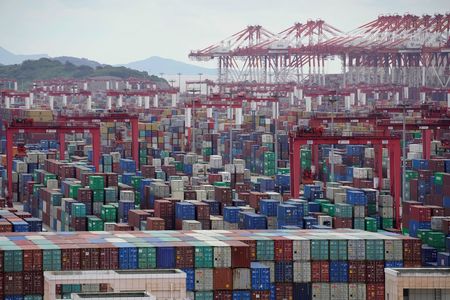
BEIJING (Reuters) -China will make port operations more efficient and hold more online trade fairs as part of a suite of new measures to ease pressure on the country’s foreign trade, Vice Commerce Minister Wang Shouwen said on Wednesday.
Export growth in the world’s second-largest economy slowed to single digits in April, the weakest in almost two years, while imports stayed flat as strict COVID-19 curbs halted factory production and crimped domestic demand.
Logistics efficiency has dropped, supply chains are not running smoothly and soaring raw material prices have put firms involved with international trade under pressure, Wang said at a press conference in Beijing.
“We must be clear about the uncertainties for foreign trade while the global economy recovery remains fragile and demand growth is still slow,” Wang said, adding that rising global inflation will reduce consumer spending on foreign goods.
Widespread and stringent COVID-19 curbs, including a full lockdown of commercial hub Shanghai in March hit Chinese factories hard and created massive supply chain disruptions that only began to ease in late April.
Wang said China will introduce targeted measures to boost foreign trade, including aid from banks on issues related to currency, shipping costs and export tax rebates.
The transport ministry will help improve port operations and more online trade fairs will be organised to help firms secure orders, Wang added.
The measures are in line with the cabinet’s previously announced policy of boosting foreign trade through export tax rebates and ensuring smooth shipments of key components and equipment.
Exports in May likely grew 8% from a year earlier, accelerating from a 3.9% expansion in April, while imports were expected to have risen 2%, according to a Reuters poll. Trade data will be released on Thursday.
China will keep its currency reasonably stable and strengthen the yuan’s flexibility, Zhou Yu, an official at the People’s Bank of China, said at the same press conference.
(Reporting by Stella Qiu, Ellen Zhang and Ryan Woo; Editing by Jacqueline Wong and Jamie Freed)

